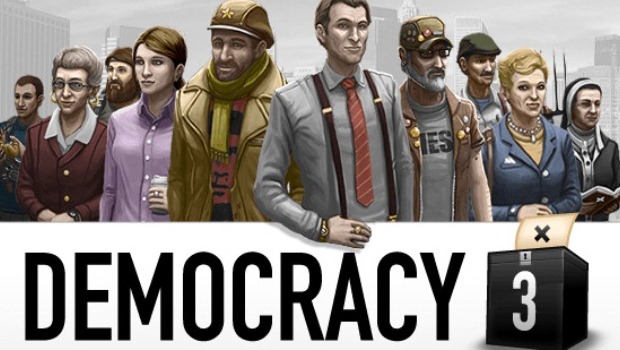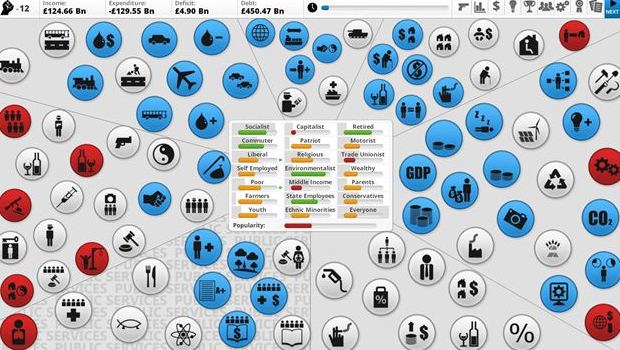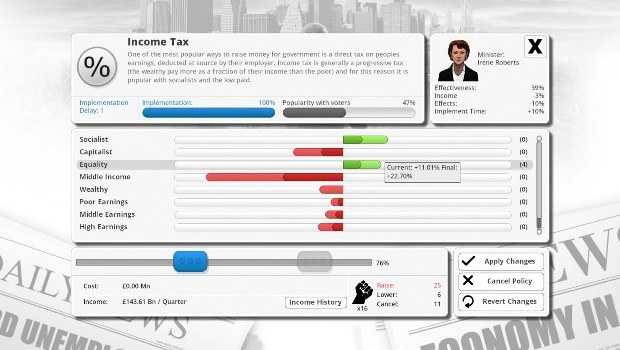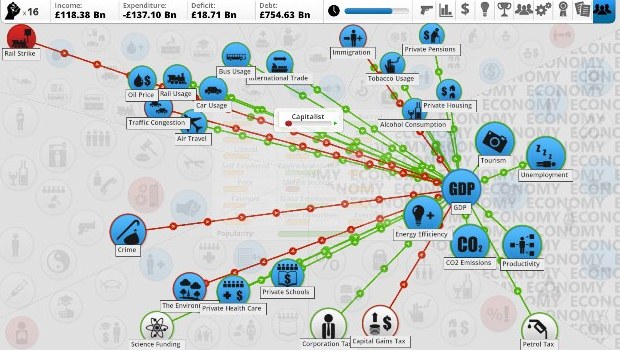A lot of people here in the U.S. think they can run the country better than the president. Various games give those gamers an outlet to run a country, whether that be a game like Civilization or Europa Universalis. I love both games, but neither really get in-depth with the political madness and shifting balances that occur while attempting to run an actual government. At a glance, Democracy 3 has a promising system in play to provide that sort of stress on a player. All it really gave me, though, was a headache and frustration.
Being a patriot and all, I usually played within the confines of my own country, the United States of America. There were other choices, but only about a dozen, including countries like Great Britain, Germany, Canada, and more. I could manipulate certain aspects of the government before I started, but running a fake version of our government didn’t really seem fun or entertaining. I think the point of the game is to try to modify the government you live in to your standard and to see the outcome; at least, that is how I wanted to play Democracy 3.
The interface looks complicated at first, but Democracy has a good tutorial that made me comprehend everything in a short amount of time. What once looked overwhelming made complete sense after about 20 minutes. The game plays out in three month turns, and starts at the beginning of a presidential term. Most of my playtime consisted of manipulating various policies and implementing new ones. Certain changes take longer to implement than others, so the aftermath of those changes took longer to see and played an important role in adjusting my nation.
It wouldn’t be much of a game if the player could freely change things around without any sort of cost. Democracy 3 administers points every turn. These points act as a currency of sorts, a reflection of what political scholars call “political capital,” because every change made took a certain number of points to modify. Raising income tax, for example, happened pretty quickly, but cost a lot of points to change. Lowering taxes on the other hand, didn’t cost as many points. But really, what government would lower income taxes, right?
At a glance, Democracy 3 looks like an evolving game, and it is – to a degree. Every game went about the same, no matter what I modified, or what problem I focused on. I climbed from a low 30% approval rating to about 50%. A dozen turns would pass, the economy would tank (not my fault), and it all went downhill from there no matter how I tried to recover. The world economy is a variable the player has little control over, but that same economy was the bane to my presidential campaign. I could eradicate mass crime in America. I could lower homelessness and poverty. I could have a strong income-to-debt ratio. But once the global economy tanked, my run was essentially over.
This is slightly better than the problem the game had pre-patch, where assassinations ran rampant. Every game ended with an assassination from one group or another. Religious zealots killed me in one game, an ethnic rights group in another. I never even saw the re-election screen before the game was patched. Thankfully, Positech heard the cries of wannabe presidents and made it so that I could turn off assassinations altogether.
The truly sad part about this whole ordeal is that Democracy 3 has a lot of fun elements to it. Random decisions every quarter, like banning alcohol ads on TV, are fun to partake in. You don’t get told how these decisions affect your campaign directly, but being propositioned with them is enough to stir up thought-provoking moments. Finagling various points in the game and seeing the outcome is a lot of fun, too, even if they lead to an uphill struggle in the end.
Being as Positech has patched the game with one game-changing fix, there is still hope for Democracy 3 to turn its course and be a more enjoyable experience. In its present state, however, Democracy 3 wears its welcome thin. Then again, maybe there is an underlying point to that difficulty; no matter what the president changes, not everything is in their control. That just doesn’t make for a very fun game after a dozen runs.
This review was written based on gameplay with review code provided by the publisher/developer. For more information on our review procedures, please read here.



